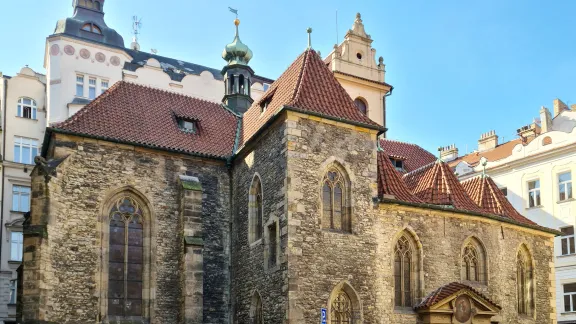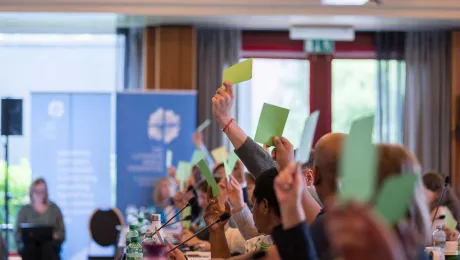
The medieval Church of Saint Martin in the Wall in Prague’s Old City where opening worship for the European Regions Meeting will be held. Photo: Ricardolovesmonuments (CC-BY)
Delegates from LWF’s European regions gather in Prague to discuss the meaning of church in secularized societies
(LWI) - What does it mean to be church today in a rapidly changing and highly secularized European context? That question will be at the heart of a European Regions Meeting in the Czech capital, Prague, next week, organized by the Lutheran World Federation (LWF) and hosted by the Evangelical Church of Czech Brethren [ECCB].
Church representatives, Council members, ecumenical officers, leaders of networks from the LWF’s three European regions [Eastern, Western and Nordic] will meet from 8 to 11 October to discuss the theme ‘Lutheran journey in a changing Europe’. Participants will reflect on the experiences of those who attended the LWF Assembly in Kraków last year, as well as exploring ways of implementing the new LWF Strategy.
Delegates will gather for opening worship in the medieval Church of Saint Martin in the Wall, a rare and well-preserved example of Romanesque and Gothic architecture in the heart of the Old City. Rev. Pavel Pokorný, leader of the ECCB, will preach, while Hungarian Bishop Dr Tamás Fabiny, LWF vice president for Central and Eastern Europe, will welcome participants.
Past suffering, present challenges
The ECCB was founded in 1918 through the unification of the Lutheran and Reformed churches in the region. As the largest Protestant church in the country, it traces its roots back to the 15th century reformer Jan Hus. Yet in the three decades since the fall of the communist regime, church membership has declined by almost three quarters and the church is currently exploring innovative ways of making itself relevant in an increasingly multi-cultural and secularized society.
Directly in front of the early 20th century Smíchov church and community center where the meeting will take place, stands a memorial to a Protestant woman who symbolizes the suffering of so many prisoners of conscience during the decades of communist repression. Lawyer, politician and women’s equality campaigner Milada Horáková was first imprisoned by the Nazis for her role as a member of the underground resistance movement during World War Two. Later, she was imprisoned by the communist authorities on charges of treason and executed in 1950 for refusing to renounce her political ideals.
As well as reflecting on past and present challenges facing their own churches, delegates will also hear testimonies from those living in war zones or situations of armed conflicts in other parts of the world. Ukrainian Professor Rev. Dmytro Tsolin will share insights on the impact of Russia’s war in his country, while Dr Fadi Atrash, head of the Augusta Victoria Hospital in Jerusalem will speak about conflict in the Middle East and educational coordinator Maureen Ogulu from Kenya will talk about the LWF’s work in South Sudan where she serves.
This event will enable the European member churches to experience communion in a tangible way.
Rev. Dr Ireneusz Lukas, LWF Regional Secretary for Europe
Sharing his hopes and expectations ahead of this first Europe-wide gathering since the Kraków Assembly, Rev. Dr Ireneusz Lukas, LWF’s Regional Secretary for Europe, said the meeting is “an important and much-awaited event which will enable the member churches of the three European LWF regions to experience communion in a tangible way. This will take place in the liturgical space, during Holy Communion services, morning and evening prayers, but also in the many conversations and discussions.”
Lukas added: “It is about exploring ways of giving a credible witness by Lutherans in Europe, through holistic mission in the context of all that we are confronted with on a daily basis. Meeting for the first time in person after the Assembly in Krakow, we want to listen attentively to each other, learn from each other and thus nurture our communion, which is a gift but also a constant task.”



